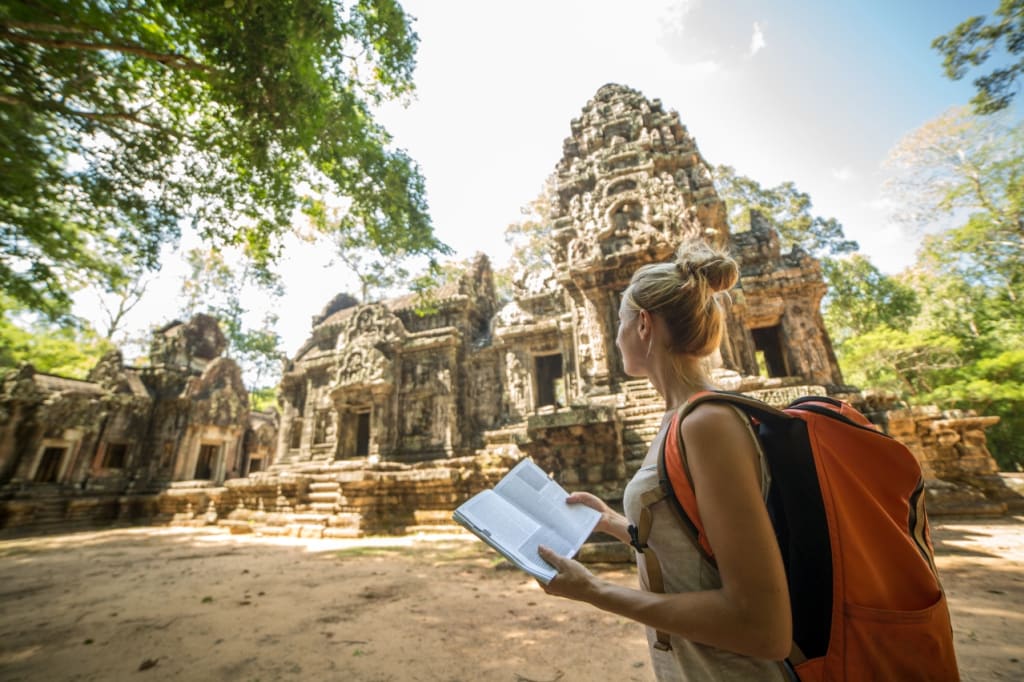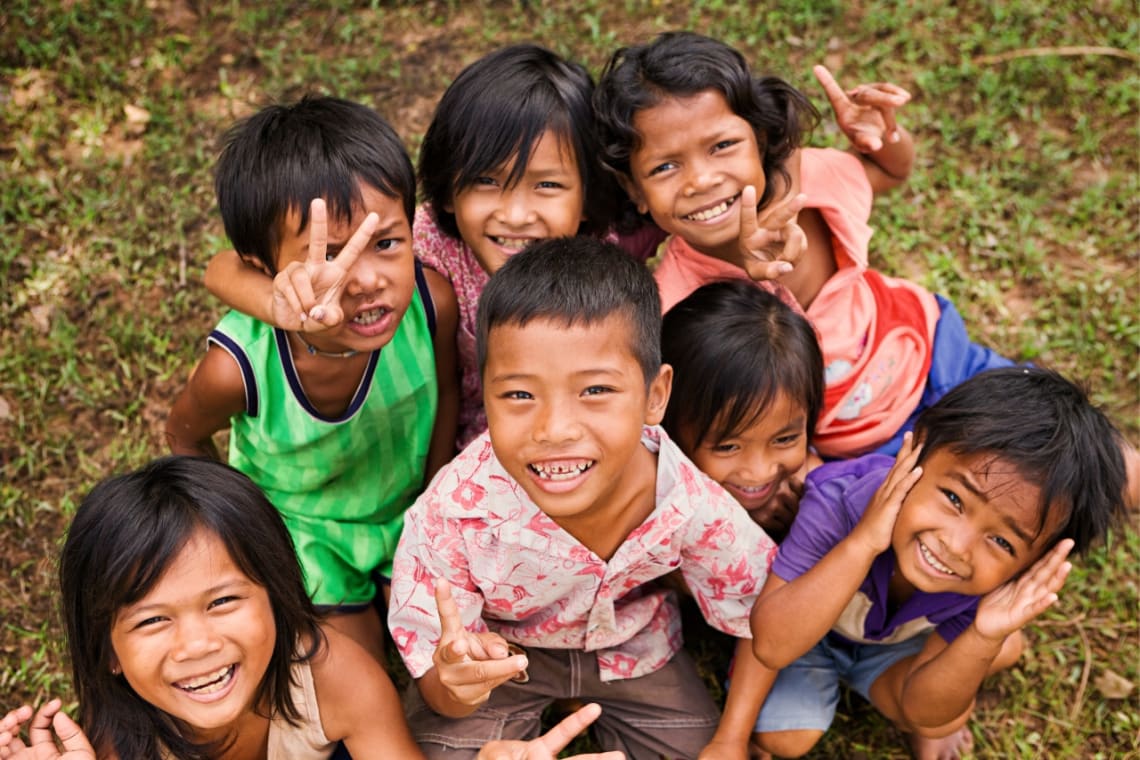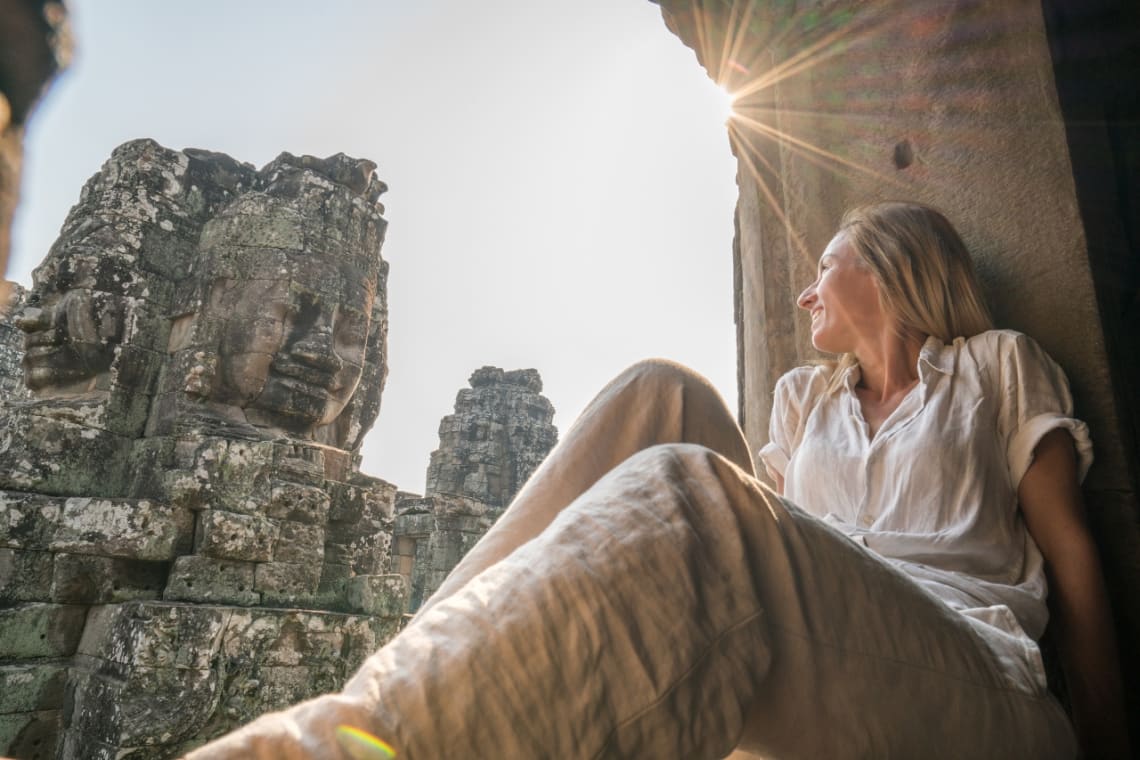
- Want a ticket worth up to $500 for free?
- Submit your answer by April 30th for a chance to win.
Planning a trip to Southeast Asia and wondering if is Cambodia safe? Get essential tips for a secure, unforgettable adventure.
9min

So, you're thinking about Cambodia. It's a place of ancient temples scattered through plains and jungle and where tradition weaves through the bustling streets. I get it, safety is on your mind — it’s crucial to any travel plans.
Emerging from the ashes of its recent dark past following the brutal genocide by the Khmer Rouge, Cambodia is currently a prominent tourist destination in Southeast Asia.
The charm of Cambodia doesn't just rest on the shoulders of its iconic Angkor Temples though; it thrives in the smiles of welcoming locals and echoes through serene landscapes. From exploring vibrant markets in Phnom Penh to unwinding by pristine beaches like those in Sihanoukville, there’s something almost magical about how time slows down here.
Beyond aesthetics, what truly sets Cambodia apart is its rich cultural tapestry woven over generations. Here you can find masterful silk weaving alongside heartwarming traditional dances - arts kept alive with fierce pride and resilience despite a tumultuous history. You might spend your mornings learning about Khmer architecture only to end your day savoring local delicacies—a testament to Cambodia's diverse allure.
Think of Cambodia not just as a destination but an experience waiting to unfurl. So let's delve into what concern us now: safety in Cambodia…
If planning a trip around Southeast Asia, you might also want to read: Is Indonesia safe? and Is Vietnam safe to travel to?

Before embarking on a journey, it is essential to prioritize safety when selecting your destination. And if you've got Cambodia on that bucket list (and why wouldn't you with its Angkor Wat and night markets?), let's set the record straight: despite some tall tales, Cambodia is generally a very safe country for tourists.
But don't just take my word for it; dive into what travel advisories say. They'll tell you that while Cambodia has a history marked by conflict, today it stands as a nation committed to growth and stability. Yes, there are areas where caution is wise—like border regions or certain rural spots—but these are well-documented and off limits, so travelers can plan their adventures smartly and without much worry.
In cities like Phnom Penh and Siem Reap, bustle does not equal danger. Keep an eye out though; petty theft can happen in crowded places (as anywhere else). Now about those landmines we hear whispers of—they're remnants from past decades mostly confined to remote areas now clearly marked or cordoned off for safety. So stick to known paths and enjoy Cambodian hospitality without undue worry.
Last pro tip? Get savvy about local customs and cultural differences before landing—that way respect flows both ways making experiences richer all around.
Suggested reading: Why you should travel like a local (even if it scares you).

When journeying through the captivating roads of Phnom Penh or discovering the enigmatical ruins of Angkor Wat, maintaining a few safety tips can make your journey even more remarkable.
First up, guard your gear like it's treasure—because to you, it is. Although not as common as in other parts of the world, pickpocketing can happen. Opt for a bag with hidden compartments or locks, keeping it in front as you navigate crowded markets or bustling bus stations. If staying at hostels or guesthouses, use safes if available; they’re there for a reason.
Buddy system isn't just for kids; it's pure gold for travelers too. Roaming with a travel companion means you've got someone to watch your back—and let’s be real, double the fun. But if solo backpacking is more your style, stay connected by sharing plans with loved ones or fellow hostel mates so someone always knows where you are.
Crazy driving can pose a danger for tourists who are distracted, happily strolling around and taking photos. While not as terrible as in Bali or Vietnam, don't expect traffic logic to be the same as in your home country.
As in pretty much anywhere else, avoid walking alone late at night, specially in big cities like Phnom Penh and Siem Reap and even more so if you're a women traveling alone.
Another wise-traveler huge no-no is getting drunk in unfamiliar surroundings. Drink moderately, even if friendly locals insist on another round of rice wine.
Cambodia's idyllic beaches and majestic temples attract tourists like bees to honey. But just as a beekeeper wears protection, travelers need to suit up against scams that could sting their wallets. Knowing the common tricks can keep your cash safe and your experience sweet.
A ride on a tuk-tuk is essential in Cambodia—until it takes you for more than a spin. Drivers might offer tours at prices that seem too good to be true because they are. They may take you to places where they get kickbacks if you buy something, or even worse, leave you stranded far from home base.
To dodge this scam, always agree on fares beforehand to avoid surprises later on—that’s negotiating 101 right there. Plus, don’t shy away from asking hostel staff about going rates—they’re usually happy to give advice that keeps things fair.
The serene smile of a monk might lure you into donating for temple repairs or orphanages—but some aren't monks at all. These phonies dress the part but pocket your donations without shame.
True monks never ask directly for money; so when approached, politely decline and donate directly at temples instead if you feel like.
Haggling over prices is part of the fun when shopping at Cambodian markets—but showing off a wad of cash isn’t wise.
Keep small bills handy (well, in this case that means a couple of thousands Riels) so you can pay without revealing your entire stash, because let’s face it, nobody needs to see how thick your wallet is unless they're making it thinner.
Near borders, 'helpful' locals might offer assistance with visa application—for an inflated fee. You don't need anyone to make the process for you, so politely but firmly decline any offer of this kind.
A really annoying situation of entering Cambodia through most land borders is the unofficial extra dollars that they charge tourist simply because they can. You can argue about this and let them know that the price they are charging you is not the official one, but they have the power to decide whether or not to let you into the country. You can already imagine who is in the most advantageous position in these cases. Typically, it's an extra USD 5 on top of the visa fee. A way to avoid this is by applying for an online visa. Although it is slightly more expensive than the 'official visa on arrival', making no economic difference on your favor, at least you won't be giving your money to unscrupulous border officials.

Cambodia greets you with open arms and a promise of adventure, but getting around safely is key to enjoying the journey.
Tuk-tuks are ubiquitous and provide an authentic feel of Cambodian streets; just make sure your haggling skills are sharp to get that fair price. If negotiating too much for a ride gets to the annoying point, Grab's ride-hailing service has landed in major cities offering safe and hassle free rides at transparent prices (and usually cheaper than tuk-tuks).
For longer distances, buses stand out as cost-effective champions—companies like Giant Ibis have racked up good reviews for comfort and reliability.
If you're feeling brave enough to navigate the traffic yourself, renting a motorbike can give you a lot of freedom. But remember, this isn't Mario Kart; wear a helmet and drive defensively because those roads can be wilder than a night market before closing time.
The rail network might not win any speed awards yet it's seeing revamps that could turn train travel into more than just moving from point A to B—it’s about soaking in slow-moving views across lush landscapes.
Staying hydrated is key here because trust me, 'Cambodian sun' isn’t just a metaphor—it’s hot. The tropical charm of Cambodia might have you feeling relaxed but remember that tap water isn’t safe to drink. Stick to bottled water or treat tap water before drinking—it's an easy fix that'll keep those dreaded tummy troubles at bay.
Dodgy tummies don't make great travel companions; having your hands clean when eating becomes as crucial as securing Wi-Fi passwords—always carry a small bottle of alcohol spray to ward off unwanted bacteria looking for free rides.
If you're on your first days of your Southeast Asian journey, you may experience the infamous 'traveler's diarrhea' due to changes in dietary habits and the tropical heat. This usually doesn't escalate, but it's important to be attentive. Rehydration salts are essential to replenish lost fluids, but visit a pharmacy to get the appropriate medication. If the situation worsens (increased fever, tremors, severe headache), don't hesitate to seek medical attention.
Ensure your vaccinations are up-to-date, including MMR, DTaP, varicella (chickenpox), polio and the yearly flu vaccine. Additionally, the CDC recommends hepatitis A and typhoid vaccines. Stray dogs are a real issue in Cambodia, and although they are generally calm, a bite can lead to serious complications.
Cambodia’s healthcare system is growing stronger but still plays catch-up compared with its neighbors. In cities like Phnom Penh and Siem Reap there are reliable hospitals, but in the case of complicated situations, you may be referred to a hospital in Thailand or Vietnam.
Having a reliable travel insurance is key for any trip of this kind. They will be your first contact number if something unwanted happens.
There is a so called "tourist police" in Phnom Penh and Siem Reap, but don't expect it to be very useful. Usually police officers speak little to no English and they will generally expect a small bribe to get a report written.
If you've experienced a crime, make sure to report it to your embassy. They can assist you in replacing your passport, connect you with local translators, and provide support in seeking medical advice if you've sustained injuries.
Australia, USA, Canada, UK, Germany, Netherlands and India, among others, have diplomatic missions in Phnom Penh, and some in Siem Reap too.

A volunteering program or work exchange through Worldpackers is another excellent way to stay safe while traveling. This is when you work in exchange for accommodation and usually other perks, like meals and tours for your help.
This type of programs not only help you saving money while traveling, but more importantly, it gives you a closer look into the local culture and way of life. You are often living and working alongside locals, so you can really get to know them and learn about how they live.
Having local insight can give you an extra boost of knowledge that many tourists don’t have. You can make friends (both locals and international volunteers), understand the area, and learn about the best things to do off the beaten path. Plus, you'll be doing a positive impact in local communities, specially if you decide to do social volunteering.
Your host wants you to have a great experience in their country, so they will help direct you to the safest areas and make sure you feel comfortable during your travels.
There are many volunteering opportunities in Cambodia, like these ones:
Get inspired by the experience of a fellow traveler volunteering in Cambodia: "I quit corporate to travel the world as a humanitarian volunteer".

Now you know, is Cambodia safe? Absolutely, with a bit of smarts. Honor local ways, always. It’s not just polite—it keeps you out of trouble. Embrace this gem in Southeast Asia fully but wisely, because that’s how great travel stories are born.
Did you like these ideas? Subscribe to the Worldpackers Community for free and start saving your favorite volunteer positions until you are ready to get verified.
Write here your questions and greetings to the author
mourad
Jan 13, 2024
Hello let's talk tomorrow about this ☺️